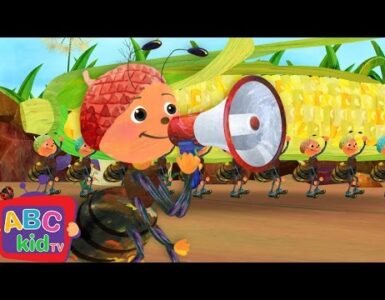Hey there, parents and little ones! If you’re on the hunt for timeless tunes that spark joy and learning in your kiddos, Old MacDonald Had a Farm is a classic that never gets old. This beloved nursery rhyme takes us on a playful journey through a bustling farm, complete with animal sounds and catchy rhythms. Here at TheTubeKids.com, we’re all about sharing entertaining videos that help children grow while having a blast. Today, we’re excited to introduce the Binkikids version of Old MacDonald Had a Farm, a 3D animated delight that’s perfect for preschoolers and beyond. Let’s dive in and explore why this song has been a favorite for generations.
The Charming History Behind Old MacDonald Had a Farm
Did you know that Old MacDonald Had a Farm has roots stretching back over a century? This cheerful folk song originated in the United States, evolving from traditional English tunes in the early 1900s. It first appeared in print around 1917, but its simple structure and fun animal noises likely made it a hit in oral traditions long before that. The rhyme paints a vivid picture of farm life, introducing kids to animals like cows, ducks, and sheep through onomatopoeic sounds – think “moo moo” and “quack quack.”
Over the years, it’s become a staple in children’s music worldwide, adapted into countless versions. What started as a way to teach about rural living has turned into an educational powerhouse. Sources like Family Lives and American Songwriter highlight how it fosters bonding between parents and children while boosting brain and language development. It’s no wonder it’s still sung in nurseries and homes today – its repetitive melody makes it easy for even the tiniest tots to join in.
Full Lyrics to Old MacDonald Had a Farm – Sing It Out Loud!
One of the best parts about Old MacDonald Had a Farm is how interactive it is. The lyrics are straightforward, building verse by verse with new animals. Here’s the classic version, as featured in many educational resources like Twinkl and Vedantu:
Old MACDONALD had a farm
E-I-E-I-O
And on his farm he had a cow
E-I-E-I-O
With a moo moo here
And a moo moo there
Here a moo, there a moo
Everywhere a moo moo
Old McDonald had a farm
E-I-E-I-O
Old MACDONALD had a farm
E-I-E-I-O
And on his farm he had a duck
E-I-E-I-O
With a quack quack here
And a quack quack there
Here a quack, there a quack
Everywhere a quack quack
Old MacDonald had a farm
E-I-E-I-O
Old MCDONALD had a farm
E-I-E-I-O
And on his farm he had a horse
E-I-E-I-O
With a neigh neigh here
And a neigh neigh there
Here a neigh, there a neigh
Everywhere a neigh neigh
Old McDonald had a farm
E-I-E-I-O
Old MACDONALD had a farm
E-I-E-I-O
And on his farm he had a Sheep
E-I-E-I-O
With a baa baa here
And a baa baa there
Here a baa, there a baa
Everywhere a baa baa
Old McDonald had a farm
E-I-E-I-O
Old MCDONALD had a farm
E-I-E-I-O
And on his farm he had some chickens
E-I-E-I-O
With a cluck cluck here
And a cluck cluck there
Here a cluck, there a cluck
Everywhere a cluck cluck
With a baa baa here
And a baa baa there
Here a baa, there a baa
Everywhere a baa baa
With a neigh neigh here
And a neigh neigh there
Here a neigh, there a neigh
Everywhere a neigh neigh
With a quack quack here
And a quack quack there
Here a quack, there a quack
Everywhere a quack quack
With a moo moo here
And a moo moo there
Here a moo, there a moo
Everywhere a moo moo
Old McDonald had a farm
E-I-E-I-OOOOOOO………
Next comes the duck: quack-quack here and a quack-quack there… Then the horse with neigh-neigh, sheep with baa-baa, and chickens with cluck-cluck. You can keep adding animals – pigs (oink-oink), dogs (woof-woof), or whatever your little one imagines! This setup encourages creativity and helps kids practice sounds, making it a fantastic tool for speech development, as noted by Musical Child.

Why Old MacDonald Had a Farm is Great for Kids’ Learning
Beyond the giggles, Old MacDonald Had a Farm packs a punch in educational benefits. According to Curious World and Cali’s Books, nursery rhymes like this one are ideal for building language skills. The repetition aids memory, while animal sounds introduce phonics in a fun way. It’s especially helpful for toddlers learning to identify animals and mimic noises, which supports early vocabulary growth.
From a developmental angle, singing this rhyme promotes social interaction – imagine your family gathered around, taking turns adding verses! It also ties into themes of nature and farming, sparking curiosity about the world. FirstCry Intelli points out how it teaches about different farm animals and their roles, blending entertainment with subtle lessons on empathy and environment. For kids in preschool or kindergarten, it’s a gentle intro to rhythm and music, which can even boost math skills through counting animals.
In our fast-paced world, simple songs like this remind us of the joy in everyday learning. Whether your child is just starting to babble or belting out full verses, Old MacDonald Had a Farm adapts to their level, making it a go-to for playtime or bedtime.
Check Out the Binkikids Version on TheTubeKids.com
Now, let’s get to the star of the show – the Binkikids animated video! Uploaded back in 2019, this colorful 3D rendition brings Old MacDonald Had a Farm to life with vibrant visuals and engaging animations. The channel, Binkikids – Nursery Rhymes, specializes in kid-friendly songs that feel like play, not lessons. With over 50,000 views and counting, it’s clear families love it.
In the video, you’ll see Old MacDonald tending his farm with adorable animals popping up in each verse. It’s short, sweet, and packed with energy to hold even the shortest attention spans. Embed it right here on your page for easy viewing:
Pair it with activities like drawing farm animals or making animal sounds during play – your kids will be hooked!
Wrapping Up: Bring the Farm Fun Home Today
There you have it – Old MacDonald Had a Farm is more than just a song; it’s a gateway to imagination, learning, and family fun. At TheTubeKids.com, we’re thrilled to share gems like the Binkikids version to make your days brighter. Grab your little farmers, hit play, and let the E-I-E-I-Os begin! If you enjoyed this, check out our other nursery rhyme spotlights for more kid-approved entertainment.













